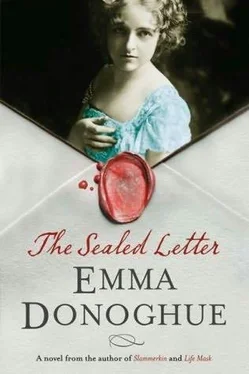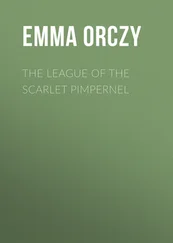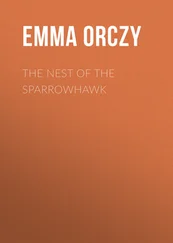"Did you hear that Dickens put his wife aside, after she'd given him ten children?"
"My dear, that story must have reached Rangoon the day after it broke," says Helen. "What a dastard, to vilify her in the papers as incapable of maternal love!"
"It's said that he's entangled himself with an actress," Fido adds, automatically lowering her voice, even though there's no one close enough to hear them on the riverbank.
"Worse," says Helen with satisfaction. "His sister-in-law."
"No!"
"I'm sure it was she I saw buying galoshes on Regent Street last week. Mrs. Dickens, I mean, not her sister. She's let herself go, dreadfully."
"She lives with the eldest son, and the others rarely visit," says Fido. "I heard she still reads every word her husband publishes. How sad."
"And how exhausting."
It's Helen's delivery, as much as what she says, that makes Fido burst out laughing. She brings out a side of Fido, a flippant, frank, almost devil-may-care side, that's been in an enchanted sleep for seven years. "Do you miss Malta?" she asks her now.
"Well, Harry certainly does," says Helen, her eyes on a pair of haughty swans. "He was top man of the top brass-whereas now he's got nothing to do but go to the odd chamber concert, or a lecture on warship design. So many wives complain they can't lure their husbands home from the club," she adds darkly, "whereas mine mopes around the house all day! I do hope they find him some paper-shuffling job at the Admiralty, or he's going to drive me and the girls to distraction with all his fussing."
"It was you I asked about," Fido reminds her. "Do you miss it?"
A little shrug. "Places mean little to me; people are all that matter."
What does that mean? Fido turns to examine Helen's face.
It came to her, during a sleepless hour last night, that if they're to take up their friendship again, it must be on new terms. In the old days at Eccleston Square, Fido was very much the junior, the subordinate-a sort of female Horatio; she can see that now. She often suspected Helen of exaggerating, obscuring her real feelings behind a lot of hyperbolic verbiage. And at the time, Fido accepted it as just Helen's way; she was too dazzled by Helen's charm to challenge her. But now Fido's a grown-up, worldly and busy. This time the two women must meet eye to eye, heart to heart, if they're to call themselves by the sacred name of friend. So she asks the question that's been on her mind. "Lucky timing, wasn't it, that Colonel Anderson's leave coincided with your family's return?" She says it as lightly as she can, but it still sounds like a knife thrust.
Helen's eyes flick to hers, then away across the river. "He expects to be recalled to Valetta shortly."
"Which is his regiment?"
"He commands the second battalion of the Twenty-Second Cheshire. One of the old school, like Harry-iron discipline, and all that."
Fido's surprised. "He seems such an agreeable fellow."
"Oh, he's pukka. Very agreeable," adds Helen. Then, in a flat voice, eyes fixed on the opaque surface of the water, "Dangerously so."
Fido's pulse is getting louder. You began this, she reminds herself.
"Do you understand me?" asks Helen, turning to squint at her slightly in the afternoon sun.
Her breath escapes as if from a balloon. "I rather hope not."
"But you do," says Helen with a half-laugh.
You were fishing, Fido rebukes herself; so don't complain if you've hooked something.
Helen rolls her head to one side, and rubs her neck as if it aches. "The man's desperately in love with me."
Fido's face contracts as if she's bitten into something rotten. "
What, I mustn't put plain words on the thing, even where there's nobody but waterfowl to hear us? Very well, let's be ever so English and say Anderson's confused, then," snaps Helen, walking faster, so Fido has to hurry to keep up. "Let's not admit that it's possible for a single man to conceive a burning attachment to a superior officer's wife. That the mother of two half-grown girls could still excite passion, at thirty-six!"
Fido opens her mouth to tell her that she's no less beautiful than she ever was, then shuts it. Helen's always needed male attention-in the old days, Fido thought of this as a minor weakness, like a craving for sweets-but there's a new, unnerving fierceness in her voice today. "Oh, Madre," she says, "you have got yourself in a scrape!"
No reply.
Out of breath, she seizes Helen by the elbow. "Slow down, and tell me all. You sound almost proud of making this fellow unhappy," she says sharply.
Helen spins around; two scarlet spots on her cheeks make her look even prettier. "On the contrary. It's all a disastrous accident."
She's like a child who's smashed a trayful of china.
"You don't know how it's been, these past years," Helen wails. "Harry's such a blank, as a husband-such a stick-in-the-mud. He doesn't want my company. In Malta, he wouldn't stay more than an hour at parties, so I was obliged to dance with other officers and have them escort me home."
Fido's mind is whirling.
"So can I help it if I've made one of my husband's friends my own, in a sincere and ingenuous spirit, and the man's persuaded himself that more is meant by it?"
"Helen," she begins sternly, "you should have cut Anderson off at the first sign of infatuation."
A shrug, very Tuscan. "What's the first sign? By the time one notices the thing, it's grown like a mushroom in the dark."
"All the more reason to root it up at once."
"I don't give him any encouragement."
"You do, I've seen it with my own eyes! What do you call running round town a deux?"
"Hardly running," Helen protests. "A little shopping, a harmless visit to a printing press…"
Fido feels a little dizzy. Could the colonel have asked for a tour of the Victoria Press as a respectable cover for a morning with Helen?
All of a sudden, Helen stops in her tracks. "Oh Fido, I can't hide anything from you. The excitement of having a handsome, sparkling fellow hang on one's every word-you can't imagine!"
Actually, Fido would rate the admiral's black-bearded, tall good looks over Anderson's golden spanielish ones, but she supposes any scowling man is less appealing than a smiling one. Fido can understand the appeal of the other sex in the abstract, but there's something missing in her; the part of a woman's heart that, in the presence of the right man, melts and runs like a vein of ore from the rock.
"Really," says Helen, grabbing her wrist, "can you blame me if I've taken his devoted gaze, like a cordial, to refresh my spirits at gloomy moments?"
"For shame! You must have known this could only cause pain to both of you in the end," Fido snaps, pulling her hand away. "As a wife and mother-"
"Now for the lecture," Helen says under her breath.
And indeed, Fido's still enough of a Faithfull to have the whole speech by rote, every principle and duty in its place…
"Don't," says Helen, pressing one finger hard against Fido's lips.
"Don't what?" But she knows.
"Don't throw stones. Don't disappoint me with what every lady in Belgravia would offer, the usual pieties and pruderies! My friend, you've made something entirely new of yourself, these past years, and it awes me to see it; you've got quite out of the rut of convention," says Helen in marvelling tones. "What you were saying about marriage the other day at my house-that a wife's whole identity is swallowed up-"
Fido tries to remember what bold statements she might have made. "Oh but my dear… I'm not being pious, nor a prude. It's a matter of…" She struggles for words. "Self-respect. Being true to oneself. You did take a vow."
Читать дальше












